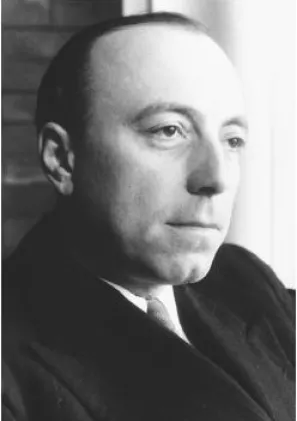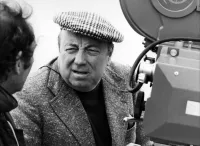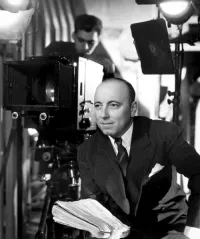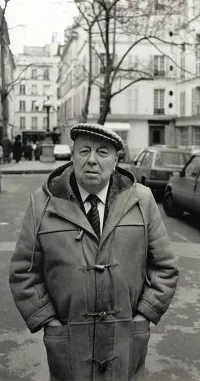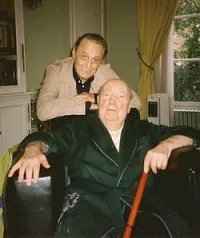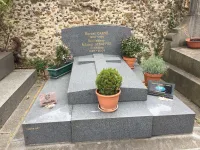Biography
1906 - 1996
“I think you never forget your childhood, whether it was happy or unhappy.”
– Marcel Carné
Marcel Carné was born in Paris on August 18, 1906. After holding various jobs, Carné became the assistant of director Jacques Feyder in 1928, and also assisted René Clair on the comedy Under the Roofs of Paris in 1930. Carné’s first solo effort was a short documentary, Nogent, Eldorado du dimanche (1929). His first directing feature came seven years later with Jenny (1936) which featured a screenplay by surrealist poet Jacques Prevert, who subsequently wrote scripts for all but one of Carné’s finest films. Carné’s next picture was Bizarre (1937). That film was the first of many collaborations with set designer Alexandre Trauner and composer Joseph Kosma. His subsequent two films, Port of Shadows (1938) and Daybreak (1939), established Carné as the dominant director of the French revival. During WWII, contemporary subjects became taboo under the German occupation, so Carné made two important period films, The Devil’s Envoys (1942) and Children of Paradise (1945). The latter is regarded as Carné’s masterpiece and is still considered one of the most beloved and admired films of all time. His final collaboration with Prevert came with Gates of Night (1946). His subsequent films include Juliette, or Key of Dreams (1951), the award winning Thérèse Raquin (1953) and The Cheaters (1958), but these films rarely approach the quality of his best work. Carné was openly gay and several of his later films contain homoeroticism, referenced gay and bisexual love, and even feature his one-time lover Roland Lesaffre. Carné continued to make films into the 1970s, with declining success. His stature as a filmmaker gradually diminished, owing mostly to changing cinematic tastes. The freedom and spontaneity of young auteurs of New Wave cinema in the early 1960s made his meticulously rehearsed and scripted films appear cold and dated. In 1983 he was made a Fellow of the British Film Institute in recognition of his outstanding contribution to film culture. He died at age 90 on October 31, 1996 in Clamart, France.
1906 - 1996
“I think you never forget your childhood, whether it was happy or unhappy.”
– Marcel Carné
Marcel Carné was born in Paris on August 18, 1906. After holding various jobs, Carné became the assistant of director Jacques Feyder in 1928, and also assisted René Clair on the comedy Under the Roofs of Paris in 1930. Carné’s first solo effort was a short documentary, Nogent, Eldorado du dimanche (1929). His first directing feature came seven years later with Jenny (1936) which featured a screenplay by surrealist poet Jacques Prevert, who subsequently wrote scripts for all but one of Carné’s finest films. Carné’s next picture was Bizarre (1937). That film was the first of many collaborations with set designer Alexandre Trauner and composer Joseph Kosma. His subsequent two films, Port of Shadows (1938) and Daybreak (1939), established Carné as the dominant director of the French revival. During WWII, contemporary subjects became taboo under the German occupation, so Carné made two important period films, The Devil’s Envoys (1942) and Children of Paradise (1945). The latter is regarded as Carné’s masterpiece and is still considered one of the most beloved and admired films of all time. His final collaboration with Prevert came with Gates of Night (1946). His subsequent films include Juliette, or Key of Dreams (1951), the award winning Thérèse Raquin (1953) and The Cheaters (1958), but these films rarely approach the quality of his best work. Carné was openly gay and several of his later films contain homoeroticism, referenced gay and bisexual love, and even feature his one-time lover Roland Lesaffre. Carné continued to make films into the 1970s, with declining success. His stature as a filmmaker gradually diminished, owing mostly to changing cinematic tastes. The freedom and spontaneity of young auteurs of New Wave cinema in the early 1960s made his meticulously rehearsed and scripted films appear cold and dated. In 1983 he was made a Fellow of the British Film Institute in recognition of his outstanding contribution to film culture. He died at age 90 on October 31, 1996 in Clamart, France.
Demography
Demography
Gender Male
Sexual Orientation Gay
Gender Identity Cisgender
Ethnicity Caucasian/White
Nations Affiliated France
Era/Epoch Information Age (1970-present) Interwar Period (1918-1939) Roaring Twenties (1920-1929) World War II (1939-1945)
Field(s) of Contribution
Film
World History
Commemorations & Honors
British Film Institute Fellow (1983)
Cannes Film Festival Dedicated in Carné’s Honor (1984)
Demography
Gender Male
Sexual Orientation Gay
Gender Identity Cisgender
Ethnicity Caucasian/White
Nations Affiliated France
Era/Epoch Information Age (1970-present) Interwar Period (1918-1939) Roaring Twenties (1920-1929) World War II (1939-1945)
Field(s) of Contribution
Film
World History
Commemorations & Honors
British Film Institute Fellow (1983)
Cannes Film Festival Dedicated in Carné’s Honor (1984)
Resources
Resources
Armes, Roy. French Cinema. New York: Oxford University Press, 1985.
Carné, Marcel. Ma Vie à belles dents: Memoires. Paris: L'Archipel, 1996.
Carné, Marcel. La Vie à belles dents: Souvenirs. Paris: J.-P. Ollivier, 1975.
Turk, Edward Baron. Child of Paradise: Marcel Carné and the Golden Age of French Cinema. Cambridge, Mass.: Harvard University Press, 1989.
https://en.wikipedia.org/wiki/Marcel_Carn%C3%A9
https://www.imdb.com/name/nm0138893/bio?ref_=nm_ov_bio_sm
http://www.britannica.com/EBchecked/topic/96287/Marcel-Carne
http://www.independent.co.uk/news/obituaries/obituary-marcel-carne-1350140.html
http://www.nytimes.com/1996/11/01/movies/marcel-carne-film-director-dies-at-90.html
http://www.frenchfilms.org/biography/marcel-carne.html
https://www.sensesofcinema.com/2011/great-directors/marcel-carne/
Resources
Armes, Roy. French Cinema. New York: Oxford University Press, 1985.
Carné, Marcel. Ma Vie à belles dents: Memoires. Paris: L'Archipel, 1996.
Carné, Marcel. La Vie à belles dents: Souvenirs. Paris: J.-P. Ollivier, 1975.
Turk, Edward Baron. Child of Paradise: Marcel Carné and the Golden Age of French Cinema. Cambridge, Mass.: Harvard University Press, 1989.
https://en.wikipedia.org/wiki/Marcel_Carn%C3%A9
https://www.imdb.com/name/nm0138893/bio?ref_=nm_ov_bio_sm
http://www.britannica.com/EBchecked/topic/96287/Marcel-Carne
http://www.independent.co.uk/news/obituaries/obituary-marcel-carne-1350140.html
http://www.nytimes.com/1996/11/01/movies/marcel-carne-film-director-dies-at-90.html
http://www.frenchfilms.org/biography/marcel-carne.html
https://www.sensesofcinema.com/2011/great-directors/marcel-carne/
